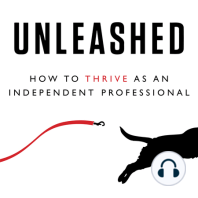54 min listen

551. Making Aid Count: Terry Roopnaraine on Development Consulting
FromUnleashed - How to Thrive as an Independent Professional
551. Making Aid Count: Terry Roopnaraine on Development Consulting
FromUnleashed - How to Thrive as an Independent Professional
ratings:
Length:
35 minutes
Released:
Feb 5, 2024
Format:
Podcast episode
Description
Show Notes: Terry Roopnaraine, a technical consultant for international development projects, has been working in the field for about 25 years. He provides technical services to support projects funded by bilateral donors, UN agencies, and multilateral agencies like the World Bank. Over the last decade, an increasingly important area of the practice has been working with foundations. Terry's work involves providing services that are required to make these projects work and deliver the best impacts on the ground for the beneficiary populations they serve. There is a huge accountability chain because these projects are often funded through the public purse of one country or another, so there must be some kind of proper accountability and evaluation. The Role of a Technical Consultant Terry talks about the roles a technical consultant might play. He divides his work into two broad areas: project implementation and management, and learning evidence and evaluation. The implementation side of technical consulting focuses on getting a project up and running, recruiting staff, putting in inputs, designing activities, and ensuring that things are run according to time and budget. The learning evidence and building the knowledge base aspect of technical consulting is also crucial, as it ensures that a program is delivering on time, not leaking funds, and has robust monitoring systems in place to capture change systematically. Evaluation of effectiveness is another dimension of technical consulting, as it is about delivering the best impact for the beneficiary population. Research and Evaluation in Technical Consulting Over his career, Terry has worked more in the research evidence and evaluation side of technical consulting, which is partly an artifact of being a refugee from academia. His intellectual and academic orientation was research-directed, and when he moved to development work, he focused more on research evaluation and evidence building. One of his early projects was Conditional Cash Transfer Evaluations in Latin America, which were an aid instrument that aimed to incentivize uptake of health and education services. These programs were popular throughout Latin America and were easy to evaluate quantitatively. However, there was a growing awareness that the program's effects were not as expected. To understand why the program didn't have the expected effects, Terry began conducting ethnographic and qualitative research. He worked with other qualitative researchers to push the idea that understanding the voices of people who were benefiting from these programs was important. Terry talks about the projects he worked on during the early 2000s in Nicaragua, El Salvador, and Peru and how his background in anthropology influenced his approach, and how they conducted research differently from previous projects. Challenges of Conducting Ethnographic Research Terry explains the challenges of conducting semi-structured interviews for management consultants and how they approach this process. The interviews were conducted in a way that was more accessible to anthropologists than for management consultants. Terry talks about the process of conducting ethnographic research in a short training workshop format. He highlights the complementarity between quantitative research findings and qualitative research findings. Survey work is broad and generalizable, while qualitative research is done over a smaller sample and is more in-depth. For example, in Nicaragua, an iron supplement for children was given out for three years, but blood tests showed no effect. In the next round of community field research, the researchers asked questions about the iron sprinkles and found that it was commonly believed that the sprinkles had a terrible reputation due to alleged health risks, and no-one wanted to pass them out. The Importance of Household and Nutrition Research Terry also discusses the importance of household research in nutrition research. Hous
Released:
Feb 5, 2024
Format:
Podcast episode
Titles in the series (100)
1. David Fields on winning clients: Right-side-up thinking to drive your consulting practice by Unleashed - How to Thrive as an Independent Professional